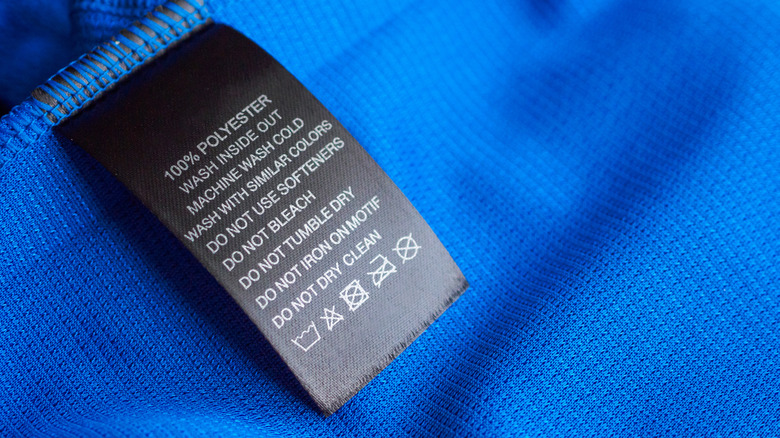Common Fabrics That Are Least Likely To Shrink In The Wash
It can be frustrating to do your laundry only to discover that your clothes have shrunk. High heat and fast spin cycles can cause many common fabrics to shrink. If you aren't careful, you may find that some of your favorite garments no longer fit you after you've washed them a few times. If you want to make your life easier and avoid these common laundry errors, think carefully about what materials the clothing and linens you use are made of.
Synthetic materials such as nylon, polyester, and spandex are favored for athletic wear and are also the best options if you want to avoid shrinkage in the wash. Although materials such as polyester can shrink just like natural materials, they're more resistant, even when exposed to high heat and fast spin cycles. They're woven tightly and have been chemically processed.
There are certainly benefits to other materials such as cotton, wool, and silk that are more prone to shrinkage. However, buying synthetic materials can be a good choice if you want to ensure your clothes won't shrink.
How synthetic fabrics make laundry easy
Synthetic materials such as nylon, polyester, and spandex aren't just convenient because they don't shrink, but they also provide other practical benefits that can make your life easier. Materials such as polyester are very durable and strong and are less likely to tear and rip. They'll stretch quite a bit when being washed on a fast spin cycle and won't develop holes easily, like silk and other delicate materials. A fast spin cycle or overloaded washing machine drum will often cause clothes to tear but this isn't common with synthetic materials due to their strength. Synthetic fabrics are also resistant to moths and insects, so this makes them even less likely to experience damage.
Synthetic materials are also quick to dry and are water and stain-resistant, This can add to your convenience both when using them and cleaning them. On top of these benefits, these materials are affordable and won't cost you as much money as natural materials will.
Drawbacks to synthetic fabrics
Although synthetic materials are convenient, they have some practical disadvantages. While they're more resistant to shrinkage, washing and drying on high heat is still bad for them and may cause damage. Ironing them should also be avoided unless you use a low-heat setting. Remember that these fabrics aren't breathable. They'll get hot and can stick to the skin while wearing. They don't absorb water and sweat well and will trap bacteria if not washed immediately.
Keep in mind that synthetic fabrics are also a poor choice for eco-friendly laundry. For the most part, they aren't biodegradable and are difficult to recycle, because chemicals are used during their manufacturing. Washing these fabrics may also harm the environment since microfibers can make their way into the ocean.
When washing synthetic clothing and fabrics, follow label instructions and use the right laundry machine settings. Wash them soon after using them, especially if they're sweaty and dirty, but only with similar colors. Always wash synthetic fabrics on low heat and spin settings to avoid damage and microfiber pollution. Don't use bleach, fabric softener, or too much detergent. Washing incorrectly will reduce the wicking power of the fabric and make your clothes less effective at blocking odors. Avoid using a dryer to dry synthetic fabrics but hang them out to dry instead. Fortunately, these clothes are fast drying anyway, so you won't have to hang them out for long until they're ready to wear again.


